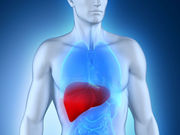After adjustment, hepatitis B virus core-related antigen was independently linked to progression
WEDNESDAY, Sept. 20, 2017 (HealthDay News) — For hepatitis B virus (HBV) carriers, hepatitis B virus core-related antigen (HBcrAg) levels are associated with progression to cirrhosis, according to a study published online Sept. 15 in the Journal of Gastroenterology and Hepatology.
Toshifumi Tada, M.D. from Ogaki Municipal Hospital in Japan, and colleagues examined the predictive impact of HBV markers on progression to cirrhosis in HBV carriers. The study included 529 hepatitis B e antigen seroconverters with FIB-4 index ≤3.6 not on nucleos(t)ide analog therapy.
The researchers found that during the follow-up period, 84 patients progressed to cirrhosis (FIB-4 index >3.6). In univariate Cox proportional hazards models, there was a significant correlation for hepatitis B surface antigen (HBsAg), HBV DNA, HBcrAg, and basal core promoter (BCP) status, but not genotype and precore status, with progression to cirrhosis. HBsAg ≥3.0 log IU/mL and HBcrAg ≥3.7 log U/mL were independently associated with progression to cirrhosis (hazard ratios, 0.53 and 3.28) after adjustment for HBV genotype, HBsAg, HBV DNA, HBcrAg, precore status, and BCP status. Hazard ratio and 95 percent confidence intervals gradually increased as HBcrAg levels increased in the hazard ratio spline curve analysis; this was not seen for increasing levels of HBsAg and HBV DNA.
“Elevated HBcrAg levels in HBV carriers increases the risk for progression to cirrhosis,” the authors write. “HBcrAg is an excellent predictor of the development of cirrhosis.”
Copyright © 2017 HealthDay. All rights reserved.








